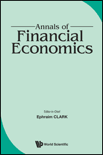
Annals of Financial Economics
Scope & Guideline
Advancing the Frontiers of Financial Knowledge
Introduction
Aims and Scopes
- Financial Market Dynamics:
The journal explores the intricate dynamics of financial markets, including stock, bond, and commodity markets, with an emphasis on volatility, pricing models, and market behavior. - Risk Management and Hedging Strategies:
Research on risk management techniques, including hedging strategies for various financial instruments, is a core area, focusing on practical applications and theoretical advancements. - Impact of Economic Policies:
The Annals examines how macroeconomic policies, including monetary and fiscal policies, affect financial markets, investment decisions, and overall economic stability. - Behavioral Finance:
The journal delves into behavioral finance, analyzing how psychological factors influence investor behavior and market outcomes, particularly in times of crisis or uncertainty. - Emerging Markets and Globalization:
There is a significant focus on emerging markets, examining their integration into the global financial system and the unique challenges they face, including issues of inequality and development. - Innovative Financial Technologies:
The journal addresses the implications of new financial technologies, such as blockchain and machine learning, on finance and economics, pushing the boundaries of traditional financial theories.
Trending and Emerging
- Impact of Pandemics on Financial Markets:
Recent studies have highlighted the effects of pandemics, particularly COVID-19, on market volatility and investment strategies, indicating a growing interest in understanding the interplay between health crises and financial performance. - Sustainability and Green Finance:
Research focusing on sustainability and the implications of green finance is on the rise, reflecting an increasing recognition of environmental factors in financial decision-making and investment. - Technological Innovations in Finance:
The integration of advanced technologies, including machine learning and blockchain, into financial research is becoming more prevalent, showcasing the journal's commitment to exploring cutting-edge developments in the field. - Behavioral Economics and Investor Sentiment:
There is a growing emphasis on behavioral economics, particularly the influence of investor sentiment on market dynamics, as researchers seek to understand irrational behaviors in financial decision-making. - Financial Inclusion and Development Economics:
The intersection of finance and development is gaining attention, with a focus on how financial systems can promote inclusion and support economic development in emerging markets.
Declining or Waning
- Traditional Valuation Models:
There has been a noticeable decrease in research centered around traditional asset valuation models, such as the Capital Asset Pricing Model (CAPM), as scholars increasingly seek alternative frameworks that account for behavioral and market anomalies. - Static Economic Analysis:
Static models that do not incorporate dynamic changes in market conditions or investor behavior appear to be losing prominence, with a shift towards dynamic, time-varying models that better capture real-world complexities. - Historical Financial Analysis:
Research focusing solely on historical financial data without integrating contemporary issues such as climate change or technological advancement is becoming less common, as the field moves towards more integrative approaches. - Single-Factor Models:
There is a diminishing focus on single-factor risk models, with researchers favoring multi-factor frameworks that provide a more comprehensive understanding of risk and return dynamics. - Standard Economic Indicators:
The reliance on traditional economic indicators, such as GDP growth, without considering broader social or environmental impacts, is declining, indicating a shift towards more holistic analyses.
Similar Journals
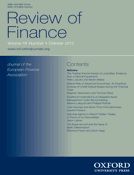
Review of Finance
Connecting theory and empirical evidence for impactful finance.The Review of Finance, published by Oxford University Press, stands as a premier academic journal in the fields of Finance, Accounting, and Economics. With an ISSN of 1572-3097 and an impressive track record stretching from 2001 to 2024, this journal is consistently recognized for its high-quality research, reflected in its Q1 rankings across key categories, including Accounting, Finance, and Economics and Econometrics. The Review of Finance is dedicated to advancing the understanding of financial phenomena through robust empirical and theoretical insights, making it an essential resource for researchers and professionals alike. Additionally, its strong Scopus rankings, placing it in the top percentiles, highlight its influence and relevance in ongoing academic discourse. Although the journal is not open access, it remains widely accessible through academic institutions, ensuring that its valuable contributions reach an extensive audience. The editorial board invites submissions that promise to further engage the academic community in the dynamic intersections of finance, accounting, and economic research.

JOURNAL OF FINANCIAL ECONOMICS
Navigating the complexities of finance and economics with clarity.Welcome to the JOURNAL OF FINANCIAL ECONOMICS, a premier publication in the realms of finance, economics, and accounting, published by Elsevier Science SA in the Netherlands. With its impactful contributions since 1974, this esteemed journal has earned an impressive impact factor and consistently ranks in the Q1 category across various fields, including Accounting, Economics and Econometrics, Finance, and Strategy and Management. Researchers can access cutting-edge studies that delve into both theoretical frameworks and empirical analyses, crucial for advancing financial literacy and economic policies globally. With remarkable Scopus rankings, notably placing #2 in Accounting and #6 in Finance, the journal serves not only as a reliable resource for academics but also as a vital tool for professionals seeking to stay abreast of the latest financial trends and insights. Engage with the latest research and contribute to the dialogue shaping the future of financial economics!
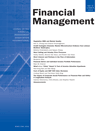
FINANCIAL MANAGEMENT
Elevating Standards in Financial Discourse and PracticeFINANCIAL MANAGEMENT is a premier academic journal published by Wiley, focusing on the intricate domains of Accounting, Economics, and Finance. With an ISSN of 0046-3892 and an E-ISSN of 1755-053X, this esteemed journal has made significant contributions to the global discourse on financial practices and theories since its establishment in 1996. Situated within the top tier (Q1) in its respective fields, FINANCIAL MANAGEMENT ranks impressively in Scopus, positioned at 30 out of 176 in Accounting and 57 out of 317 in Finance, reflecting its high impact and relevance in the scholarly community. The journal is known for its rigorous peer-review process and publishes cutting-edge research aimed at advancing knowledge and practice in financial management. Although it does not offer Open Access, it remains accessible through institutional subscriptions, ensuring that researchers, professionals, and students remain at the forefront of developments in financial management. With a commitment to excellence, FINANCIAL MANAGEMENT continues to be an indispensable resource for those seeking to deepen their understanding of this critical field.
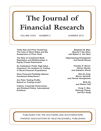
JOURNAL OF FINANCIAL RESEARCH
Empowering Researchers in Financial MethodologiesThe JOURNAL OF FINANCIAL RESEARCH, published by WILEY, stands as a pivotal platform for disseminating innovative research in the fields of finance and accounting since its inception in 1978. With an ISSN of 0270-2592 and an E-ISSN of 1475-6803, this journal aims to address contemporary challenges and trends within the financial research landscape. It has achieved notable recognition, being placed in the Q2 category for both Finance and Accounting in the 2023 rankings, signifying its relevance and impact within the academic community. Although it does not currently offer open access, the journal is accessible through various academic databases, catering to a diverse audience of researchers, professionals, and students keen on advancing their knowledge and understanding of financial systems and methodologies. With an evolving scope that encompasses empirical studies, theoretical frameworks, and practical applications, the JOURNAL OF FINANCIAL RESEARCH is committed to contributing valuable insights into the complexities of financial practices and policies.
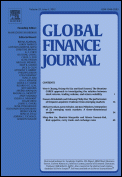
Global Finance Journal
Pioneering research for a global financial future.Global Finance Journal is an esteemed periodical published by Elsevier, dedicated to the dynamic fields of finance and economics. With an impressive history spanning from 1989 to 2024, this journal holds a significant position in the academic community, boasting a Q1 quartile ranking in both Economics and Econometrics, as well as Finance, as of 2023. It is highly regarded in Scopus rankings, placing 40th out of 317 in Finance and 99th out of 716 in Economics and Econometrics, demonstrating its influence and reach among researchers and practitioners alike. Although not an open-access journal, the Global Finance Journal provides rigorous peer-reviewed articles that explore critical issues, advance theoretical frameworks, and address practical applications in global finance. As such, it serves as a vital resource for researchers, financial professionals, and students aiming to deepen their understanding of economic phenomena and contribute to the ongoing discourse in these vibrant disciplines.
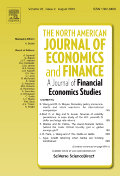
North American Journal of Economics and Finance
Bridging theory and practice in finance and economics.The North American Journal of Economics and Finance is a premier academic journal published by Elsevier Science Inc. since 1992, dedicated to advancing the field of economics and finance through rigorous research and scholarship. With an impressive impact factor and recognition in the Q2 category for Economics and Econometrics and Q1 for Finance as of 2023, this journal holds a significant position in the academic community, ranked #41 out of 317 in Finance and #100 out of 716 in Economics. The journal features high-quality, peer-reviewed articles that cover a broad range of topics, from theoretical frameworks to empirical analyses and practical applications. Though not an open-access platform, the journal provides valuable insights for researchers, practitioners, and students alike, promoting knowledge dissemination in the dynamic landscape of economic and financial studies. With its commitment to excellence, the North American Journal of Economics and Finance serves as an essential resource for those seeking to deepen their understanding of contemporary issues in these critical fields.

Annals of Finance
Pioneering Insights in Economics and FinanceThe Annals of Finance, published by Springer Heidelberg in Germany, stands as a pivotal journal within the realms of Economics, Econometrics, and Finance. With a dedicated convergence of research from 2005 to 2024, this esteemed publication features thought-provoking articles that address both theoretical and practical aspects of finance, earning it a commendable Q2 category ranking in the 2023 metrics for both Economics, Econometrics and Finance as well as Finance. The journal serves an essential role in disseminating knowledge and fostering advancements in the field, appealing to researchers, professionals, and students alike. Its rigorous peer-review process ensures the integrity and quality of published works, making it a reliable source for cutting-edge findings and discussions within the finance community. For those looking to navigate the complexities of modern finance through rigorous research, the Annals of Finance is an invaluable resource.

Annals of Economics and Finance
Cultivating Scholarly Excellence in Economics and Finance.Annals of Economics and Finance is an esteemed academic journal published by Wuhan University Journals Press, focusing on the fields of Economics and Finance. Established in 2000, this journal serves as a platform for scholars to disseminate their research findings and insights, contributing to the development of these disciplines through rigorous peer-reviewed articles. Despite currently holding a Q4 ranking in both Economics and Econometrics and Finance categories (2023), it strives to enhance its impact on the academic community and policy-making audiences. While not Open Access, the journal seeks to cultivate a deeper understanding of vital economic theories and financial practices, thereby offering invaluable resources for researchers, professionals, and students alike. With its broad scope, the Annals of Economics and Finance is poised to play a crucial role in shaping contemporary economic discourse up to 2024 and beyond.
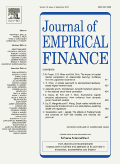
Journal of Empirical Finance
Driving innovation in finance with evidence-based studies.Journal of Empirical Finance, published by Elsevier, stands as a key resource in the areas of finance and economics, with a definitive focus on empirical studies. As a prominent journal since its inception in 1993, it has made significant strides in contributing to the academic community, evidenced by its soaring categorization in Q1 for Finance and Q2 for Economics and Econometrics as of 2023. With an ISSN of 0927-5398 and an E-ISSN of 1879-1727, the journal emphasizes robust, data-driven analysis to inform both theoretical and practical aspects of financial research. While access options do not include open access, the journal ensures that its content remains accessible to a diverse audience of researchers, professionals, and students. It fosters a platform for innovative research and discourse, significantly impacting the fields of finance, economics, and econometrics. The Scopus rankings further bolster its reputation, placing it in the 61st percentile in both categories, reflecting a commitment to high-quality research output. As the journal continues to evolve, it invites contributions that push the boundaries of empirical finance, enabling a deeper understanding of financial mechanisms that drive global economies.

Pacific-Basin Finance Journal
Navigating Economic Dynamics in the Pacific RegionPacific-Basin Finance Journal is a prestigious academic journal that focuses on critical developments and innovative research within the fields of finance and economics, specifically tailored to the Pacific region's unique economic landscape. Published by Elsevier, the journal boasts an impressive impact factor and is categorized in the Q1 quartile for both Economics and Econometrics and Finance as of 2023. This indicates its high relevance and position among the top journals in its field, with Scopus rankings reflecting a strong standing in the competitive landscape of finance research, holding the 45th position out of 317 in Finance and the 108th in Econometrics. Established in 1993, the journal is committed to disseminating rigorous theoretical and empirical research findings that enhance the understanding of financial systems in the Pacific Basin. Although the journal is not open access, it provides invaluable insights and comprehensive studies aimed at professionals, researchers, and students alike, fostering a deeper comprehension of the region's economic dynamics and global interconnectedness.